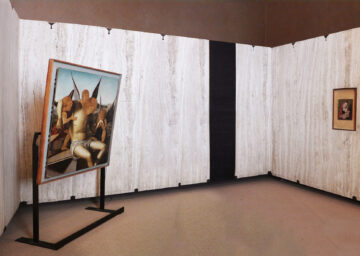Unframed Edges
doctoral dissertation by Flavia Crisciotti
This thesis takes its title and theme from a 1942 article by Italian preservation expert Cesare Brandi, who illustrated the criteria for exhibiting paintings at the Istituto Centrale di Restauro. The restored masterpieces were presented here without protective crystals or frames “in order to reveal their edges,” clarified Brandi. Spotlighting the unframed edges went hand in hand with the modernist interest in a pure display of art. The architect Giuseppe Pagano, for instance, expressed the need “to present the Old Masters in their primary nakedness” in the pages of Casabella. Pietro Maria Bardi, an art critic, called on architects to reject the picture frame in interiors as it was superfluous. Soon, the display of the unframed canvas became a powerful tool for modernising museums, where architects and museum directors replaced picture frames with novel mounting mechanisms. Drawings, frescoes, and canvases were deliberately situated in the middle of the galleries to be illuminated by natural light and inspected intimately by the visitors.
However, the picture frame resurfaced in the museological interventions of the 1960s, when conservation issues and conflicting curatorial strategies made the display of the unframed canvases critical. As such ephemeral practices of display sometimes do, the sophisticated mounting mechanisms fell out of fashion. In permanent collections they were altered or even removed, reasserting the importance of the picture frame as evidence of the creative process. This previously unexplored history of “unframed edges” will be used as a point of entry into the criteria that led modernist architects to lay out art. Through a detailed study of archival sources, the project first traces the rejection of the picture frame in early 20th century discourse on ornamentation, and finally, reconsiders the modernist arrangements in light of discourse on preservation practices and material science.
Scholarships | Studienstiftung des deutschen Volkes, DAAD
Mentor | Prof. Mari Lending, OCCAS (The Oslo Centre for Critical Architectural Studies)
